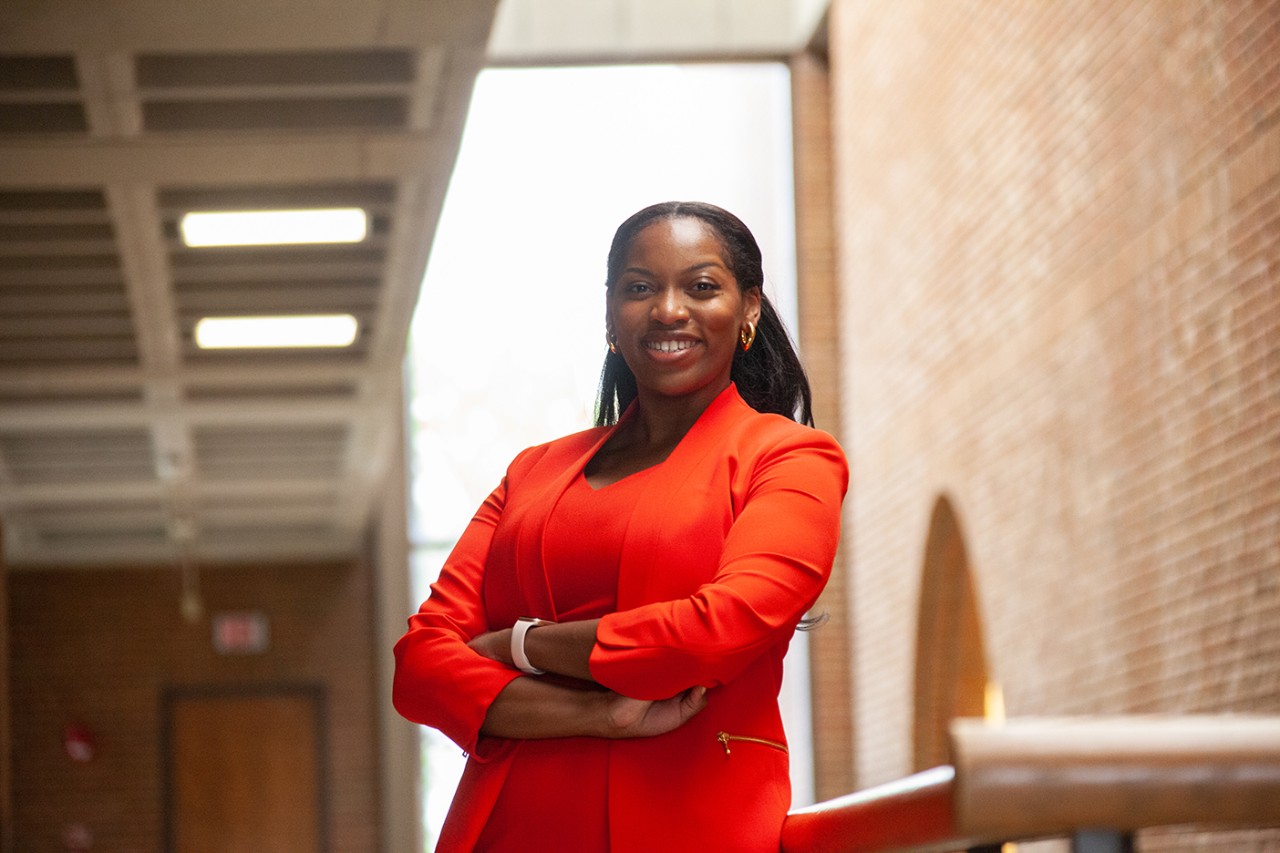
Black History Month at UC Law: Ashley Nkadi
UC Law 2L Ashley Nkadi discusses why celebrating Black History Month is important
Ashley Nkadi is a second-year law student at the University of Cincinnati and a Nathaniel R. Jones Center for Race, Gender, and Social Justice Fellow. She graduated from the University of Cincinnati, where she co-founded the Irate-8, a student-led digital social activist movement. She spoke with us about why celebrating Black History Month is important, especially in the context of the College of Law. Learn more about Ashley's journey to law school in a Counselor Magazine feature from this past summer.
Who is a historical and/or current-day figure who inspires you to commemorate Black History Month? Why do they inspire you?
I am incredibly inspired by the work of field and digital organizers like Fresco Steez. Fresco builds and shifts cultural narratives through design, digital communications, and social media. So much of what we do these days — our social and professional interactions, how we receive information, even our college education — occurs virtually. Digital organizers like Fresco are critical because they strategize how to facilitate advocacy and activism within the digital space.
What does celebrating Black History Month mean to you, as an individual?
Black History Month to me is no different than any other month. Every day, I make an effort to learn about those who came before me, and how I can draw on the rich tapestry of Black History in order to build Black futures.
In what ways do you consider Black Achievement to be important in today's society?
Black achievement is American achievement. It's global achievement. Each and every day, Black people around the world make contributions to their local, national, and global communities. These contributions, in turn, advance science, education, politics, and the material conditions of families.
Why is celebrating Black History Month important at the College of Law?
In 1880, William Howard Taft graduated from UC College of Law. He would go on to (successfully) run for President of the United States. During his campaign, he promoted the idea that Black people should not be a part of politics and vowed not to appoint any to federal positions. Fifty years after he crossed the UC Law Commencement stage, so would Helen Elsie Austin. She was the first Black woman to graduate from UC’s College of Law in 1930. Seven years later, she became both the first woman and first African-American to be named assistant attorney general of the state of Ohio. Celebrating Black History Month is important at UC Law because we have a part in both sides of history, and it is crucial to tell that story.
How do you see your study of law intersecting with Black History?
I feel that Black History and Law are inextricable. Much of legal history, from court decisions to policymaking, revolve around the disenfranchisement of Black families and other marginalized groups. Historically, the law was a tool of oppression. However, fierce advocates, lawyers, and lobbyists have also used the law as a tool to liberate communities from these very historical barriers.
What do want future generations to know about Black History and Black Achievements?
I want future generations to know that Black History is being created right now, all around us. Too often we learn about the contributions and legacies of Black people when they pass away. On our campus, right now, Black women like Bleuzette Marshall, Verna Williams, and Lenecia Nickell are making history. Don't miss the opportunity to learn from these trailblazers while they are here. Black History is our past but it is also our present.
Discover what's Next at Cincinnati Law
Immerse yourself into a community dedicated to educate and inspire leaders to pursue justice and advance the role of law in society. Dive into unique opportunities to defend the wrongfully convicted, fight for human rights around the globe, combat the economic inequalities of today, and lift members of underserved communities.
Join the fight and apply to one of the Nation’s Top Social Justice Law Schools.
Featured Image: Joe Fuqua
Tags
Related Stories
From first-year uncertainty to a passion for land use law: meet Robby Belt
February 16, 2026
2L Robby Belt shares is story of learning to navigate law school.
Nominate exceptional mentors for national recognition
February 16, 2026
UC College of Law is working with several law faculty to identify mentors and determine what characteristics make the best mentor-mentee relationships.
UC’s research surges with $346M in awards
February 12, 2026
The University of Cincinnati reached $346 million in sponsored research awards in fiscal year 2025, up 6.6% increase over the previous year. Additionally, funding for clinical trials at UC climbed, with $88 million in industry-sponsored awards and $33 million in federally sponsored awards.
